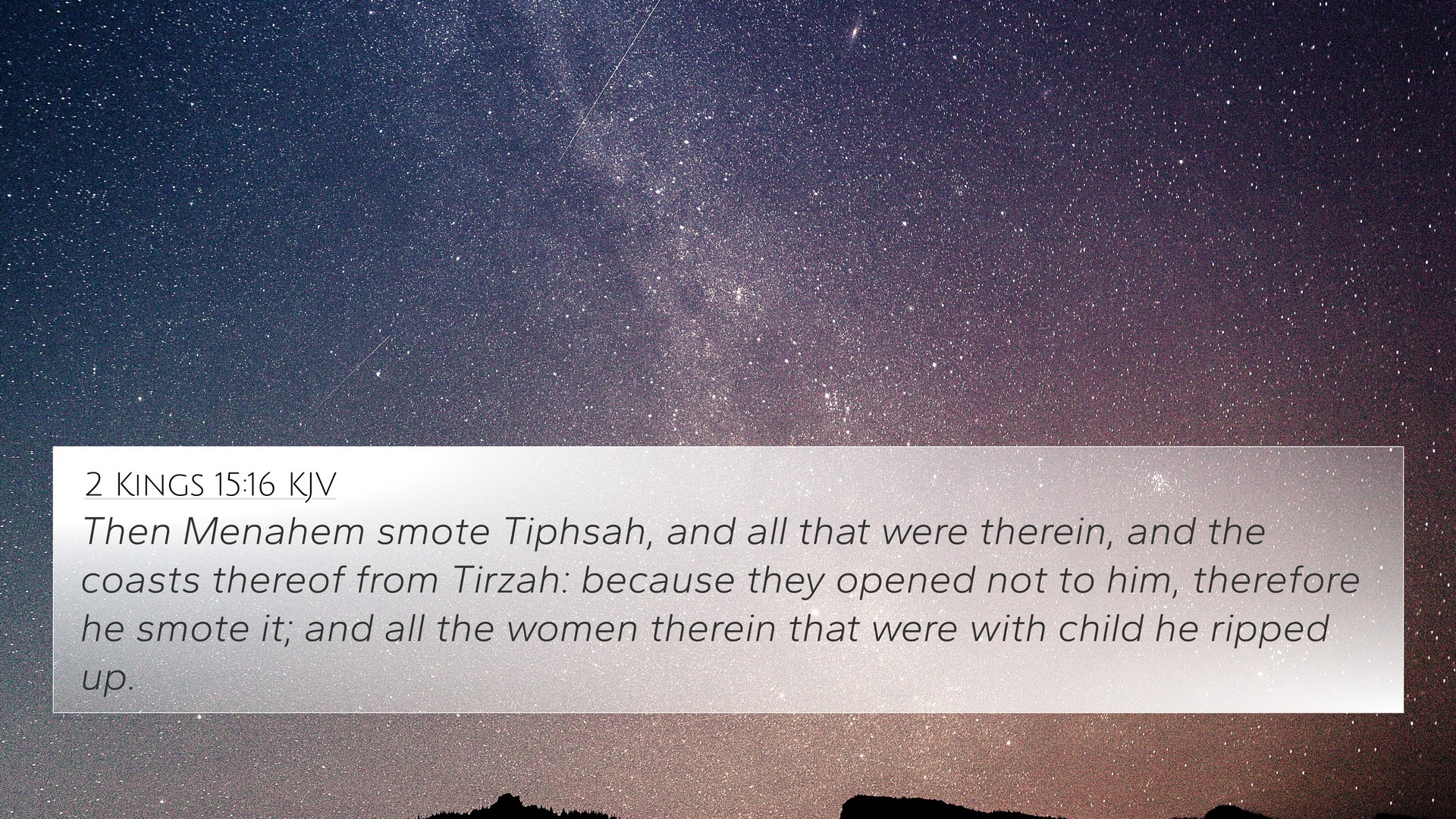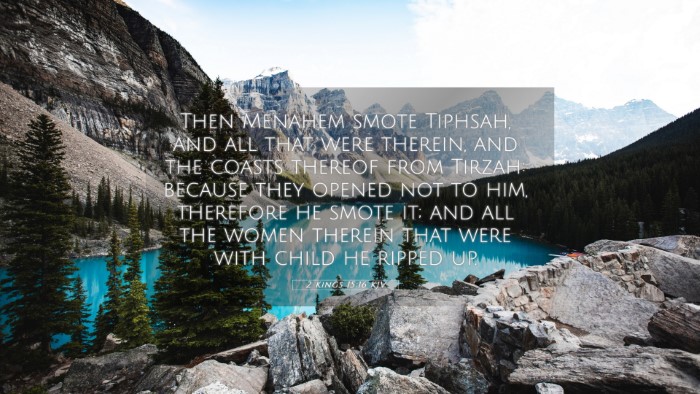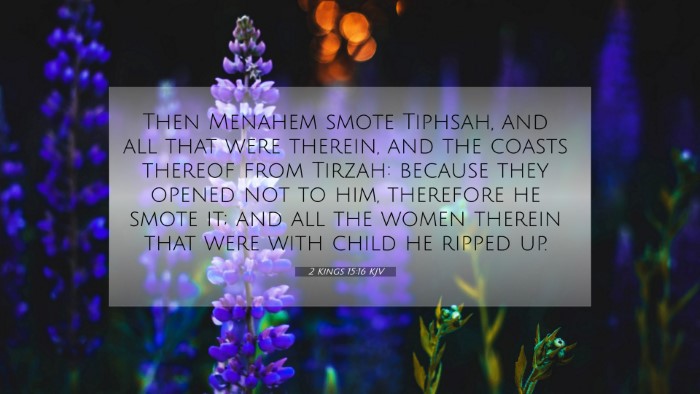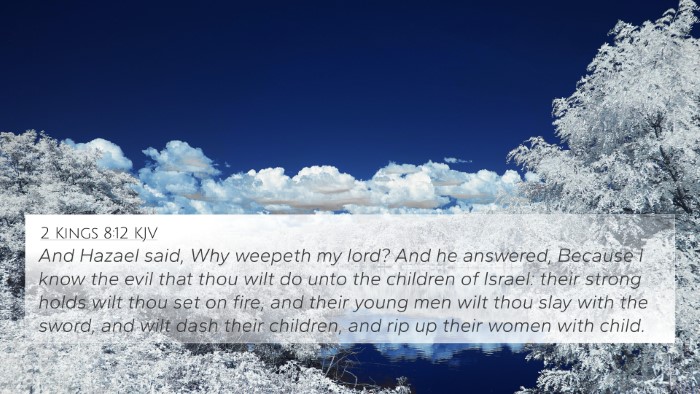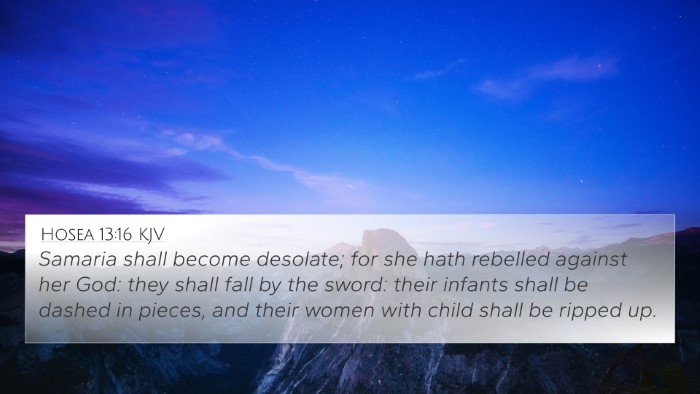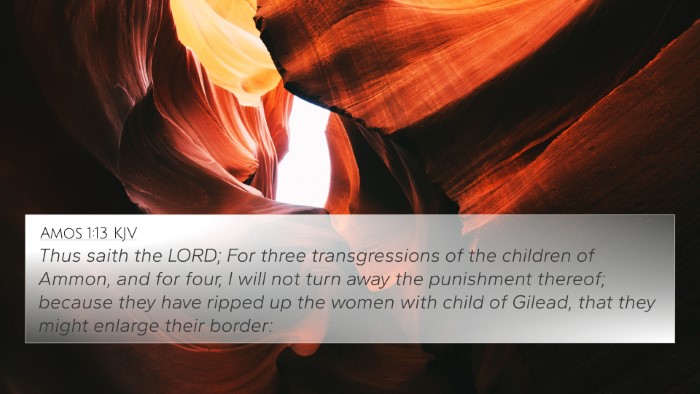Understanding 2 Kings 15:16
Verse Reference: 2 Kings 15:16 - "At that time, Menahem attacked Tiphsah and all who were there, and its borders from Tirzah; for he laid siege to it, and because they opened not to him, therefore he slew all the male children, and all the women that were therein, and ripped up all the pregnant women."
Contextual Overview
This verse is situated in a turbulent period of Israel's history, characterized by political instability and moral decline. Menahem came to power during this era, and his reign is marked by violence and oppression.
Meanings and Insights from Public Domain Commentaries
Matthew Henry's Commentary
Matthew Henry emphasizes the brutality of Menahem's actions. He draws attention to the extreme measures taken against the city of Tiphsah, which signifies the wrath and tyranny of Menahem's reign. Henry notes that this event illustrates the consequences of Israel's turning away from God, leading to such cruel judgments upon cities that resisted the king.
Albert Barnes' Notes
Barnes offers insight into the strategic military actions taken by Menahem. He observes that the siege was not just a display of power but also a means to solidify Menahem's position against rivals. The act of slaughtering children and pregnant mothers portrays the depths of depravity into which Israel had fallen and signifies divine judgment upon the nation for its sinfulness.
Adam Clarke's Commentary
Adam Clarke underscores the importance of understanding the historical and cultural context of this violence. He relates the siege of Tiphsah to the wider theme of God's judgment on Israel for its idolatry and moral corruption. Clarke highlights that such episodes serve as warnings for future generations about the tragic consequences of disobedience to God's commands.
Cross-References and Thematic Connections
This brutal narrative in 2 Kings 15:16 can be linked to several other biblical texts, highlighting themes of judgment, violence, and the consequences of sin. These connections facilitate a better understanding of the overarching messages in Scripture.
- Hosea 13:16: "Samaria shall become desolate; for she hath rebelled against her God." This verse parallels Menahem's actions as a result of rebellion against God.
- Isaiah 13:16: Describes the horrors of war, similar to the violence depicted in Menahem's siege.
- Micah 3:10: Critiques rulers who build Zion with bloodshed, echoing Menahem's ruthless behavior.
- Luke 19:44: Jesus predicts destruction for Jerusalem, likening it to the consequences of rejecting God's ways.
- Psalm 137:9: "Blessed is he who seizes your infants and dashes them against the rocks!" This verse echoes the same tragic theme of violence against the innocent.
- Jeremiah 49:2: "Therefore behold, the days are coming," declares the Lord, "when I will send out a fire against Bozrah; and it shall consume the palaces of Basra." Here, God’s imminent judgment is depicted.
- Exodus 20:13: "You shall not murder." Highlights the moral violation of Menahem's actions.
- 2 Kings 8:12: Describes the violence and bloodshed during Jehu's reign, establishing a thematic connection to Menahem's rule.
- Proverbs 14:34: "Righteousness exalts a nation, but sin is a reproach to any people." Reflects the need for moral integrity in leadership.
- Revelation 6:10: The cries of martyrs seeking justice resonate with the sorrow of oppressed populations throughout biblical narratives.
Thematic Bible Verse Connections
This passage serves as a poignant reminder of the violence and moral decay that can arise when a nation turns away from divine guidance. The execution of the innocent during Menahem's siege foreshadows the ultimate judgment that the Israelites would face throughout their history, reinforcing the need for repentance and faithfulness to God's covenant.
Conclusion
2 Kings 15:16 presents a grim tableau of the consequences of sin in leadership and the devastating effects of political power divorced from righteousness. The commentary insights combined with cross-referential texts provide a comprehensive understanding that encourages reflection on the importance of justice, mercy, and humility before God.
Tools for Bible Cross-Referencing
For further exploration of thematic connections and comparative analyses of biblical texts, consider utilizing tools such as:
- Bible Concordance: A valuable resource for finding verses related to specific words and themes.
- Bible Cross-Reference Guide: Helps identify connections between scriptures across different books of the Bible.
- Cross-Reference Bible Study: An effective method to deepen your understanding of biblical messages.
- Comprehensive Bible Cross-Reference Materials: Extensive collections of verses that relate various biblical teachings.
Final Thoughts
By engaging with 2 Kings 15:16 and its adjacent texts, we gain deeper insight into the serious consequences of moral failure within leadership and the overarching narrative of divine justice throughout the scriptures. This encourages a reflective approach to how biblical principles can be applied in contemporary life.
